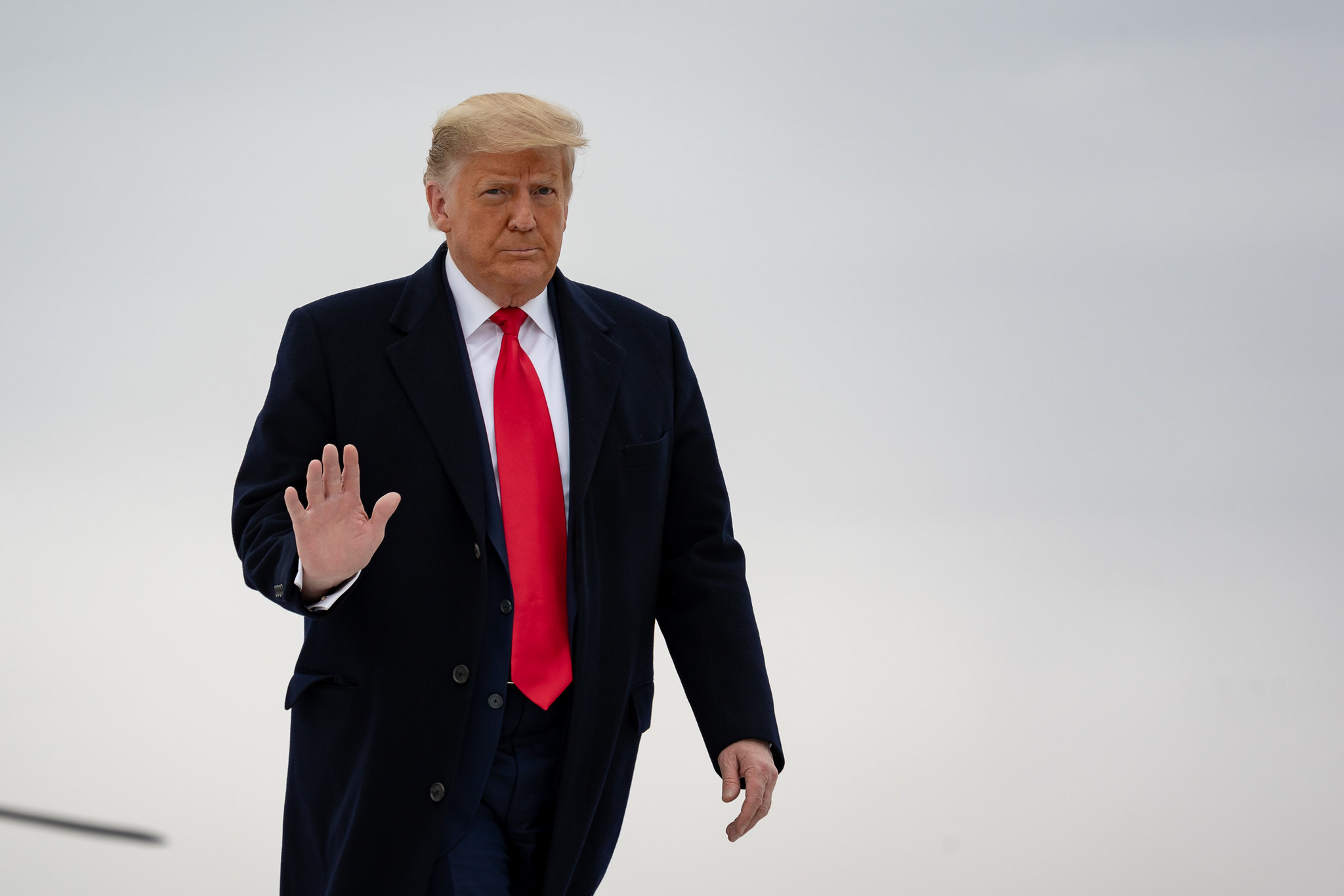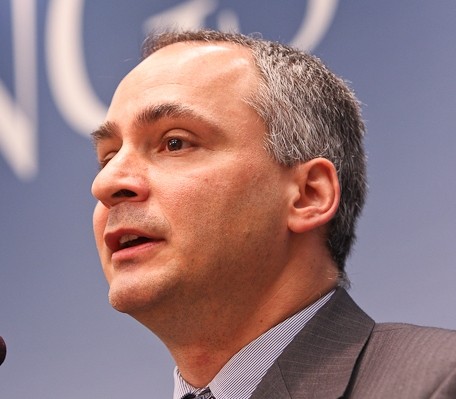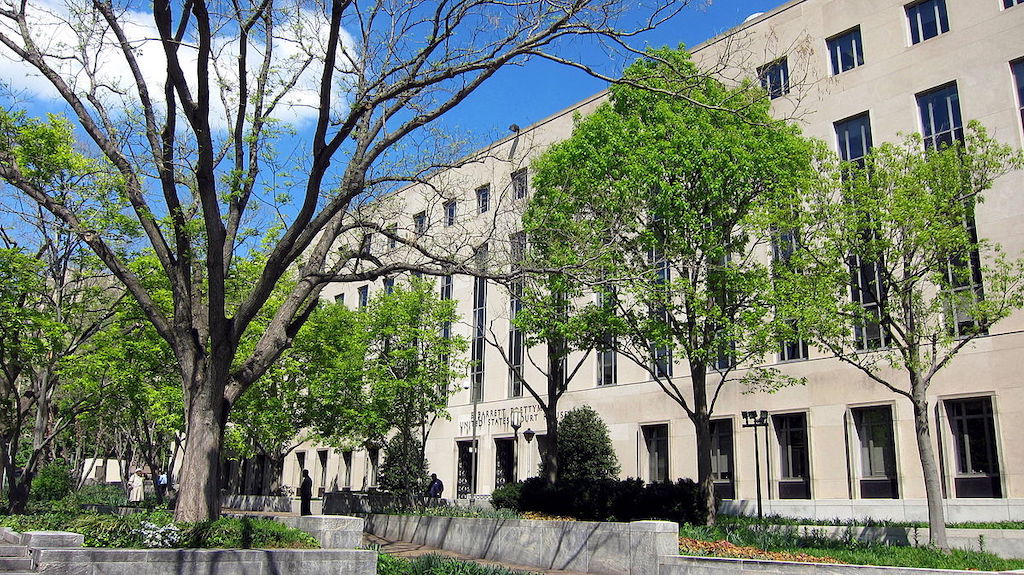Trump Loses Big on Executive Privilege
The former president is in a dramatically weaker position than he was before the latest D.C. Circuit opinion.

Published by The Lawfare Institute
in Cooperation With

Don’t look now, but the law of executive privilege has undergone a substantial shift.
The Supreme Court Wednesday evening denied a motion by former President Trump to block the National Archive from turning White House materials to the House Select Committee on the January 6 Attack. The peculiar, four-page order, is a complicated document, but in combination with the broad and underdiscussed D.C. Circuit opinion it leaves in place, it has profound implications for Trump’s ability, and that of his allies, to make executive privilege claims in response to demands for testimony and information from the committee.
On its face, the Supreme Court’s order yesterday appears to mitigate the consequences for Trump of a D.C. Circuit opinion that rejects a number of his key claims in resisting the committee. The D.C. Circuit opinion has been hanging around since early last month with little notice or discussion—probably because the Supreme Court was poised to jump in any time. But in fact, the Supreme Court action does not mitigate the matter for Trump.
Put simply, the former president, whether he knows it or not, is now in a dramatically weaker position than he was only recently with respect to the committee. The new legal landscape, for example, almost certainly means that two top Trump officials—former White House Chief of Staff Mark Meadow and former top adviser Steve Bannon—can no longer argue that the privilege prevents them from cooperating with the committee. The same applies to other potential witnesses, and to the former president himself, should the committee seek his testimony. All, of course, may well continue to resist anyway—but if so, they proceed at much greater risk to themselves.
Herein a guide for the perplexed.
What the Courts Actually Did
The Supreme Court and D.C. Circuit action has taken place in the case of Trump v. Thompson, in which the former president sued to prevent the National Archives from turning over Trump’s correspondence and documents related to the Jan. 6 attack to the committee.
At the D.C. Circuit, a three-judge panel determined that former President Trump could not assert executive privilege to prevent disclosure of documents subpoenaed by the committee, at least insofar as the legislative and executive “[b]ranches agree that there is a unique legislative need for these documents and that they are directly relevant to the Committee’s inquiry into an attack on the Legislative Branch.”
The D.C. Circuit also held, in tandem with its first conclusion, that it “need not conclusively resolve whether and to what extent a court could second-guess the sitting President’s judgment that it is not in the interests of the United States to invoke privilege.” Disputes between the President and Congress over document requests usually trigger balancing tests under which—per Mazars v. Trump and Senate Select Committee on Presidential Campaign Activities v. Nixon—courts are to weigh competing constitutional interests. But here, the court rules, “[u]nder any of the tests advocated by former President Trump, the profound interest in disclosure advanced by President Biden and the January 6th Committee far exceed his generalized concerns for Executive Branch confidentiality.”
In the Supreme Court’s order Wednesday evening, the justices appeared to cabin the D.C. Circuit’s ruling a bit. The order, representing all of the justices save Clarence Thomas, reads:
Because the Court of Appeals concluded that President Trump’s claims would have failed even if he were the incumbent, his status as a former President necessarily made no difference to the court’s decision. Any discussion of the Court of Appeals concerning President Trump’s status as a former President must therefore be regarded as nonbinding dicta.
The ruling thus seems to reserve for another day the question of whether a former president can assert the privilege—and Justice Kavanaugh actually wrote a short opinion explaining why he disagrees with the D.C. Circuit on the point.
But the justices also seized on the D.C. Circuit’s alternative basis for resolving the case—which is actually far broader than the mere proposition that a former president can’t assert the privilege in the face of the current president’s objections. Eight justices of the Supreme Court, declined publicly to note that they would disturb the D.C. Circuit’s finding that Trump’s executive privilege claim would fail even if he were the incumbent president. In the past, the court observes, Presidents have “waived privilege in times of pressing national need.” The D.C. Circuit ruled, and the Supreme Court left undisturbed, that the Jan. 6 insurrection was a “clear and apparent effort to subvert the Constitution.” In such an “extraordinary” situation, any President’s claim of executive privilege will fail to stand up to Congress’s need for investigation and, in turn, disclosure of the former president's communications.
So where does this string of events leave the law of executive privilege in the D.C. Circuit? Not in a good place for the former president in his battles with the committee. It is still possible the Supreme Court will choose to review the D.C. Circuit opinion, though that seems unlikely given that its order Wednesday allowed the Archives to turn the disputed material over to the committee. So the following analysis is necessarily at least a little bit tentative at least until the Court issues a formal denial of certiorari. That said, it’s a bad set of developments for the former president.
To see just how bad, one needs to go through the D.C. Circuit’s ruling carefully. This opinion is now the law of the circuit and will affect every case litigated, as all Jan. 6 executive privilege claims will be, in a district court in Washington.
Legitimate Legislative Purpose
The first big problem for Trump is that the D.C. Circuit panel ruled unequivocally that the Jan. 6 committee has a legitimate legislative purpose. This is a big deal beyond the scope of executive privilege claims specifically. Trump and his allies have been using the claim that investigating committees lack legitimate legislative purposes as a basis for resistance to investigative demands since the Democrats took control of the House in 2019. That argument is no longer available in the D.C. Circuit with respect to the Jan. 6 Committee.
Congress’s investigatory power—and, in turn, the power of committees to issue subpoenas—is ancillary to its legislative authority. In other words, a committee subpoena must advance a legislative purpose to be enforceable. And even before they assert executive privilege, in the Jan. 6 context and in earlier congressional investigations, Trump and his allies often assert that a subpoena is invalid for the lack of such a purpose.
The court, however, determined that the Jan. 6 Committee’s subpoenas are part and parcel of Congress’s legislative authority: there are “few, if any, more imperative interests squarely within Congress’s wheelhouse than ensuring the safe and uninterrupted conduct of its constitutionally assigned business,” the panel writes. The court also concluded that the Committee “demonstrated a sound factual predicate” for requesting documents from Trump since there is a “direct linkage between the former President and the events of the day.”
The requested documents will not only detail the nature and extent of Trump’s communication with his supporters—for example, beckoning them to Capitol Hill on Twitter—but will also shed light on the intelligence failures in the government that caused “the government to be underprepared for such a violent attack.” The panel writes that “the legislative interest at stake passes muster under any of the tests pressed by former President Trump.” The Supreme Court did not disturb the D.C. Circuit’s finding that the committee has a legitimate legislative purpose.
The D.C. Circuit’s language about the scope of valid legislative inquiry—that is, activity related to the interruption of the electoral college certification—implicates not only the production of documents by the National Archives but also potential witness testimony. The court has ruled that conversations that took place in the White House on Jan. 6 are legitimate grounds for a committee subpoena. And now, for example, former White House Chief of Staff Mark Meadows will likely be unable to situate himself outside the scope of the committee’s legitimate investigation. Meadows has argued that he need not comply with committee demands because the subpoena to him furthers no legislative purpose—an argument he first articulated in a letter to the Committee and then in filings with the D.C. District Court. This argument will not hold water any longer.
The opinion similarly suggests that the subpoena issued by the committee to Steve Bannon has a legitimate legislative purpose. Bannon reportedly met with GOP lawmakers at the Willard Hotel on the eve of the insurrection to persuade them to block certification. How and why lawmakers were pressured to abandon their constitutional duties surely bears on Congress’s responsibility to, in the words of the D.C. Circuit, “adopt measures to...ensure the peaceful transfer of power.” Bannon has not, to our knowledge, contested the committee’s subpoenas on grounds that they lack a nexus to legislative purpose, but so long as Trump v. Thompson stands, such a claim would likely be futile.
The impact of this aspect of the D.C. Circuit’s ruling is already being felt in the lower courts. Politico’s Kyle Cheney reported Thursday that Judge James Boasberg—in a hearing in the case of Trump spokesperson Taylor Budowich’s efforts to oppose the committee’s access to his financial records—“note[d] that the Supreme Court left in place the Appeals Court determination that the Jan. 6 committee has a legitimate legislative purpose—effectively invalidating claims by Trump allies that it doesn't.” In other words, the weight Trump and his allies have put on this claim is already causing problems for litigants seeking to resist committee information collection.
Executive Privilege Balancing
Perhaps more important still is the D.C. Circuit’s ruling that executive privilege claims will fail when balanced against the committee’s need for information. This holding is critical because, as the Supreme Court noted, it doesn’t depend on how one assesses the ability of a former president to assert the privilege.
Notwithstanding the Supreme Court’s description of this as a wholly alternative basis for resolving the case, the D.C. Circuit’s rulings on the point are pervasively intertwined with its insistence that the incumbent president, not a former president, is master of the privilege. That said, there is no question that the panel decision weighed the committee’s need for information against Trump’s confidentiality interests and found the committee’s position more substantial.
The committee, the D.C Circuit concluded, has a “uniquely weighty interest in investigating the causes and circumstances of the January 6th attack so that it can adopt measures to better protect the Capitol Complex, prevent similar harm in the future, and ensure the peaceful transfer of power.” The committee’s demands for the former president’s documents surrounding the Capitol attack, in other words, falls “squarely within Congress’s wheelhouse” and are a valid exercise of Article I authority. The magnitude of this interest “far…outweigh[s] the former President’s privilege claim.”
The court concluded:
That accumulation of forces favoring disclosure is at least equal to, if not greater than, what has supported the disclosure of the privileged materials of even a sitting President. To establish a likelihood of success in prevailing, then, former President Trump bears the burden of at least showing some weighty interest in continued confidentiality that could be capable of tipping the scales back in his favor, and of “mak[ing] particularized showings in justification of his claims of privilege[.]” He has not done so. He has not identified any specific countervailing need for confidentiality tied to the documents at issue, beyond their being presidential communications. Neither has he presented arguments that grapple with the substance of President Biden’s and Congress’s weighty judgments. Nor has he made even a preliminary showing that the content of any particular document lacks relevance to the Committee’s investigation. He offers instead only a grab-bag of objections that simply assert without elaboration his superior assessment of Executive Branch interests, insists that Congress and the Committee have no legitimate legislative interest in an attack on the Capitol, and impugns the motives of President Biden and the House. That falls far short of meeting his burden and makes it impossible for this court to find any likelihood of success.
It’s hard to imagine, though not impossible, that any witness claiming executive privilege would be able to offer a more compelling basis for shielding his or her conversations with Trump about the same events on the same day as Trump was able to offer about his White House records about Jan. 6. In other words, if you’re a witness who is refusing to testify because of a claim of executive privilege, it is now the law of the D.C. Circuit that Congress’s interest in the information the committee is seeking from you is more substantial than Trump’s interest in confidentiality—and would be so even if Trump were still in office. What’s more, only one justice of the Supreme Court appears to have a big enough problem with that conclusion to do anything about it.
The Former Guy Issue
The Supreme Court actually did not even disturb the D.C. Circuit’s ruling on the former president’s ability to assert executive privilege over the objection of the incumbent president. It merely declared that part of the D.C. Circuit ruling nonbinding dicta in what is itself a non-precedential order. This means that while it seemed to brush away the D.C. Circuit’s ruling about former presidents and the privilege, a lower court still has to consider it.
To be sure, the issue takes on less importance in light of the justices having amplified the D.C. Circuit’s contention that Trump’s executive privilege claims would lose even if he were still president. That said, the D.C. Circuit had a lot to say on the subject. And a district court in the D.C. Circuit will still have to consider the language indicative of the thinking of the relevant appellate body, even if the language isn’t strictly speaking controlling.
So keeping in mind that the justices says this is all dicta and at least two of them disagree with it, let’s take a look at the D.C. Circuit’s evaluation of the “former guy” issue in executive privilege.
The court emphasizes that its decision comes in the context of a “rare and formidable alignment of factors.” First, that President Biden, the sitting President, refused to assert privilege over the documents requested by the Committee, having determined that doing so would “not in the best interest of the United States.” Second, that Congress is seeking information “vital” to its legislative purpose. Third, that Congress and the President have engaged in a process of negotiation and accommodation over the requested documents.
President Biden’s “assessment that the best interests of the Executive Branch and of the Nation” warrant disclosure to the Jan 6. Committee, the court contends, carries “immense weight” and ultimately “overcome[s] the former President’s assertion of privilege.” The sitting President is, the court explains, the “principal holder ... of executive privilege, and he speaks authoritatively for the interests of the Executive Branch.”
The court writes that a former president’s executive privilege claims are particularly weak where the political branches—the executive and legislative branches—agree that a particular set of documents should be disclosed to a congressional committee. That’s the case here. As it pertains to Trump’s documents at the National Archives, the Jan. 6 Committee and the White House agree that Congress has a “compelling need” to review the requested presidential communications and “to understand the circumstances ... that led to the most serious attack the operations of the Federal Government since the Civil War.”
This does not, to be clear, mean that a former President can never assert executive privilege. The Supreme Court decided that issue long ago, holding in Nixon v. GSA that a former President retains some authority to assert executive privilege. But a former President’s assertion of executive privilege, the court concludes, is an insufficient basis to override the judgment of the current president and Congress that the documents should be disclosed.
It is clear from the Supreme Court order that at least two justices—Thomas and Kavanaugh—disagree with this analysis. Thomas, the opinion notes, would have granted Trump’s request for an injunction or stay, implying that he believes the former president has a likelihood of success on the merits. And Kavanaugh, while joining the other justices, wrote a brief opinion explaining his disagreement with the D.C. Circuit on this point. “A former President must be able to successfully invoke the Presidential communications privilege for communications that occurred during his Presidency, even if the current President does not support the privilege claim,” writes Kavanaugh, who served as a White House lawyer during the Bush administration. If there is no assurance of “continuing confidentiality,” he writes, Presidents and their advisers will be unable to engage in “full and frank deliberatio[n]” and the President will be unable to discharge his constitutional duties.
But given that Kavanaugh would not join Thomas in granting Trump’s petition and clearly understands that the court’s action dooms other executive privilege claims before the Jan. 6 committee, his concern here appears to be not for Trump but for other former presidents in the future. What the court has done here, in effect, tables the question of who controls executive privilege for another day and another congressional confrontation.
Implications for Witnesses
Let us review the state of play between the Jan. 6 Committee, the White House, and any witness who holds out on the committee on the basis of a claim of executive privilege. Two of Trump’s top advisers, recall, are doing exactly that—and have been held in contempt for it. In September, the Jan. 6 Committee subpoenaed Mark Meadows and Steve Bannon, seeking documents and testimony related to the insurrection and efforts by the Trump White House to overturn the results of the 2020 election. Bannon refused to cooperate with the Committee outright, while Meadows initially agreed to provide documents and appear for an interview. Cooperation between Meadows and the Committee broke down in December, however, and things have since been at a standstill ever since.
Bannon and Meadows have refused to cooperate with the Committee on grounds that President Trump instructed them not to and, relatedly, that their documents and testimony are subject to the former President’s assertion of executive privilege. Meadows has taken it a step further, asking a court to declare the Committee’s subpoena invalid because it “unlawfully seeks information covered by executive privilege” and because it “does not further a valid legislative purpose.” (Meadows also has made a related argument that he is immune from congressional testimony. This argument is not specifically addressed in the Thompson opinion and will require separate disposition.)
These arguments are all effectively resolved by the D.C. Circuit’s decision and its handling by the Supreme Court.
The case significantly complicates Meadows’s assertion that he is “precluded from making a unilateral determination to waive Executive Privilege claims by the former president.” Biden has refused to assert privilege over Meadows’ documents and deposition, just as he did with the former President’s documents. Moreover, the White House counsel provided Meadows with a written explanation of the president’s decision. At least in the D.C. Circuit, such an explanation is likely to demonstrate a “careful and cabined assessment” of the nation’s best interests. Given the court’s understanding of the nature of executive privilege and the weighty role that a sitting President plays in making such a determination, Meadows’ reliance on the former president’s claim that the documents are protected from disclosure by executive privilege is likely to fail. And even if all of that is just dicta, the D.C. Circuit has weighed Trump’s need for confidentiality in this situation against Congress’s need for information and found the privilege claim wanting under any balancing test.
Steve Bannon has also cited the former President’s claim of executive privilege for his refusal to comply with Committee’s demands for documents and testimony. Again, President Biden has waived any privilege over Bannon’s documents and testimony and White House counsel has provided Bannon’s lawyer with a written explanation of the decision. And again, even assuming there’s a privilege at issue here, the balancing test has already been performed by the D.C. Circuit—and failed.
To the extent that Meadows and Bannon had defenses against contempt prior to the D.C. Circuit’s action in Trump v. Thompson, a witness taking a similar stance now would not—and Meadows and Bannon would not if the committee issued a new subpoena or if the Justice Department were to expand the scope of the contempt prosecution to cover Meadows’s and Bannon’s non-compliance following the D.C. Circuit and Supreme Court’s resolution of the relevant legal questions.
The press may not have noticed how much the law has changed this past month, but lawyers for other reluctant witnesses certainly will.




